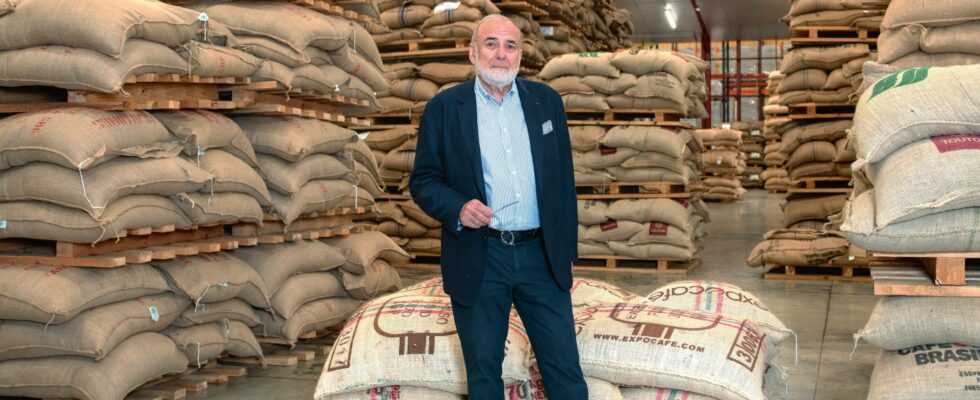The small company from Nice has become one of the market leaders by focusing on organic, fair trade and made in France.
In a shed, jute bags piled up by the thousands, filled with coffee beans from Cambodia, Laos, Burma… “Before being transported here, they were picked by hand one by one, pulped, washed, dried by small producers from twenty different countries,” explains Jean-Pierre Blanc, Managing Director of Malongo. The beans will then be roasted in huge old-fashioned machines, before being canned or repackaged in pods. “We produce 6,500 tons of coffee a year. And donate over $2 million in development bonuses to all of our co-ops. »
Its know-how has been exported to the United States, the Emirates, Spain, Italy, and even Asia
It seems a long time ago when Malongo, created in 1934, was limited to a small roastery in the heart of Nice. Since Jean-Pierre Blanc took over the reins forty-two years ago, the brand committed to fair trade since 1992 has continued to prosper, making it a point of honor to maintain its production in Carros, in the hinterland of Nice. “It all started in a village in Mexico, where I had met the priest Francisco Van der Hoff, who had founded the Max Havelaar label to sell the crops of Indian communities at a fair price on the European market,” says -he. Gradually, its roasting know-how was exported to the United States, the Emirates, Spain, Italy, and even Asia.
With a turnover of 120 million euros, the Nice SME which belongs to a family of Franco-Belgian shareholders, the Rombouts, in coffee for four generations, has risen to the rank of world leader in organic coffee. and fair trade in supermarkets in France, becoming number two (on weekly sales) for ground coffee, behind Carte Noire. But his coffee also supplies hotels and restaurants, a network of nine Malongo shops, including five in France, three in the Philippines, one in Georgia.
Its “coffee of small producers”, described as “anti-Nespresso”, heckles the codes of marketing
The reasons for the success? Faced with competition, Malongo has been able to innovate, injecting 1.5 million euros into research and development each year. Its “coffee for small producers”, described as “anti-Nespresso”, heckling marketing codes with its box decorated with a photo of Mexican farmers, has remained a bestseller. In 1997, it was the first to offer natural paper pods, whose sales now represent 40% of its turnover. “It sells 300 million a year. Not much compared to the billions of aluminum capsules produced by our competitors…” His latest find? The “cold brew”, a cold coffee infusion like in the United States, but without sugar or artificial flavors, concocted from a pure arabica from Ethiopia, where it federated 1,000 families around 40 villages.
For him, the made in France is not limited to the manufacture of coffee, it now includes that of its machines. “Relocation”, he only has this word in his mouth… A month ago, he repatriated part of his production from Asia, inaugurating a unit which employs 30 people, near La Roche-sur-Yon, in Vendee. “We call on suppliers within a radius of 30 kilometers,” he says. It annoyed me to produce in Asia, whereas in France we have the capacity. » Are the labor costs high? He was able to circumvent them, simplifying his manufacturing process, betting on volumes, which he would like to increase by 10%, with 100,000 machines marketed per year.
Also read. Max Havelaar: 30 years of fair trade
With the Eoh, sold at a price of 119.90 euros, guaranteed for five years and recyclable, he hopes to impose himself on the ultra-competitive market of the pod, which represents half of the sales on the shelves of supermarkets in France. And above all to accelerate its export development, which absorbs 15% of its turnover. “Five countries are applicants, including South Korea and Indonesia,” he said. The countries where his drinks work best? The United States and Asia, “even if, since the Covid, we are trying to reorient ourselves towards the European market”. The product that everyone loves? Its “Élysée” range, with notes of red fruits, apricot and liquorice, marketed to support the restoration work of the presidential palace. Made in France, all the way.
